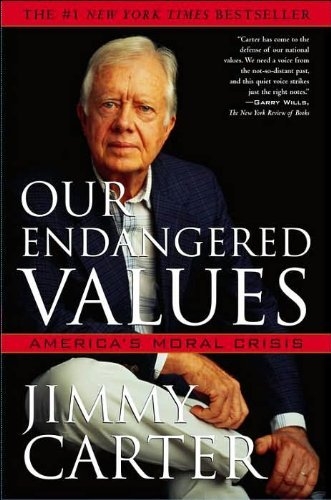Even at his most irate, Jimmy Carter projects cool, communicating with a poise that commands attention while gently signaling to opponents that they better do their homework before mounting any sort of debate. Perhaps that's why the former president, Nobel Peace Prize-winner, and bestselling author ranks as one of the planet's most respected voices in the areas of human rights, diplomacy, and good government. And when a clearly agitated Carter suggests America is on a slippery slope, globally speaking, as he does throughout Our Endangered Values: America's Moral Crisis, it's wise to pay heed even if the book's overriding Christian perspective may trip cautionary bells in secular readers. More a set of loosely connected essays than a single, precise argument, Our Endangered Values outlines Carter's worldview while pondering what he posits are key problems looming in the 21st century. Thematic touchstones such as the war, environmental negligence, civil liberties, the rich-poor divide, and the separation of church and state form the book's backbone, with Carter filtering each through the prism of his own vast experience. He doesn't much like what he sees. Though much of the data Carter presents to support his arguments is familiar, it's worth repeating that "the rate of firearm homicides in the United States is nineteen times higher than that of 35 other high-income countries combined." That "In addition to imprisonment, the United States of America stands almost alone in the world in our fascination with the death penalty, and our few remaining companions are regimes with a lack of respect for basic human rights." That when it comes to sharing the wealth with poor nations "Americans are the stingiest of all industrialized nations. We allow about one-thirtieth as much as is commonly believed [or] sixteen cents out of each $100 of the gross national income." America: land of the free, home of the brave? Try global bully with a bad attitude and reckless sense of entitlement. Carter spends significant time contextualizing his own spirituality, as if to underscore the urgency of his message that fundamentalism in any form is bad, especially when it encroaches on government. Indeed, Carter persuasively links fundamentalism to harmful policy, the subjugation of women, general xenophobia, and a host of other ills occurring all around him. And while George W. Bush in particular and the current administration in general take fewer clips on the chin than might be expected, Carter's arguments for common-sense change are deeply resonant nonetheless. --Kim Hughes
Authors
Jimmy Carter
Additional Info
- Release Date: 2006-09-26
- Publisher: Simon & Schuster
- Format: Paperback
- ISBN: 9780743285018
No copies of this item are currently available.
